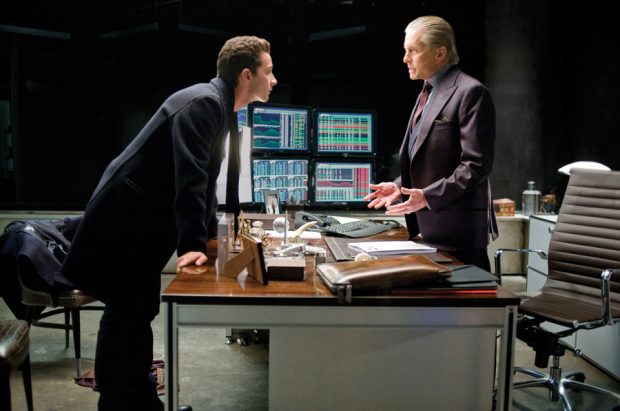Movie Review
‘Wall Street: Money Never Sleeps’
Young Wall Street trader Jake Moore (Shia LaBeouf) has a fateful confrontation with the legendary Gordon Gekko (Michael Douglas).
To Stone’s defense, it seems that no one really knows why economies crash. It has something to do with subprime loans, fast-spoken acronyms and absurd bonuses. If you’re looking for more answers, I can’t help you—and neither can the movie. Instead, Stone has his characters blandly philosophize about the pros and cons of greed and luxury.
The first “Wall Street” was a superb artifact of the ’80s. It followed a yet-to-be-creepy Bud Fox (Charlie Sheen) as an ambitious broker from humble origins whose daddy issues get him entangled in insider trading and the ruthless, wealthy and overall man’s man Gordon Gekko (Michael Douglas). After they’re screwed over by Gekko, Fox and his father get all kinds of financial revenge, and Gekko gets imprisoned. It’s kind of like what happened to Martha Stewart.
This time, instead of Fox, we get Jake Moore (Shia LaBeouf), who, with a bit less hair gel, wouldn’t look a day older than Michael Cera. So what’s he doing on Wall Street? He’s some kind of economic whiz kid, which is apparently all you need to be to get into an investment-banking boardroom and become the sole benefactor for a large-scale green energy power plant. When Jake’s firm goes belly up—a canary warning of the looming crash—he gets thrown about by the invisible hands of a cutthroat billionaire (Josh Brolin) and Gekko, as he tries to rebuild his empire.
The whole point of the first “Wall Street” was that hard work wasn’t enough—to make it big, you have to bend the rules. Not for Jake. One look at his studio apartment tells you he’s halfway between bohemian and high roller, and so is his fiancée, Winnie Gekko (Carey Mulligan), a left-wing blogger rebelling against the avarice of her father. Maybe it’s Stone’s compliment to this generation, but the fact that the youth of today are singularly associated with activism flattens the surprisingly good acting from both LaBeouf and Carey Mulligan.
Still, it’s better to be one-dimensionally moral than one-dimensionally evil, as the adults are molded. Just after the 2008 crash, we look inside the Federal Reserve Board, where, in front of George Washington’s portrait, the leaders of Wall Street’s major banks announce to the Treasury their need for a bailout. A benefit dinner the next night shows the same crowd plus bejeweled wives, and, as the camera zooms from table to table, there’s neither a hint of modesty nor remorse. Here, Stone has found his target, but the aim of “Wall Street: Money Never Sleeps” lies mostly on Jake, whose head is already in the right place, and the whole movie seems like a missed opportunity.

